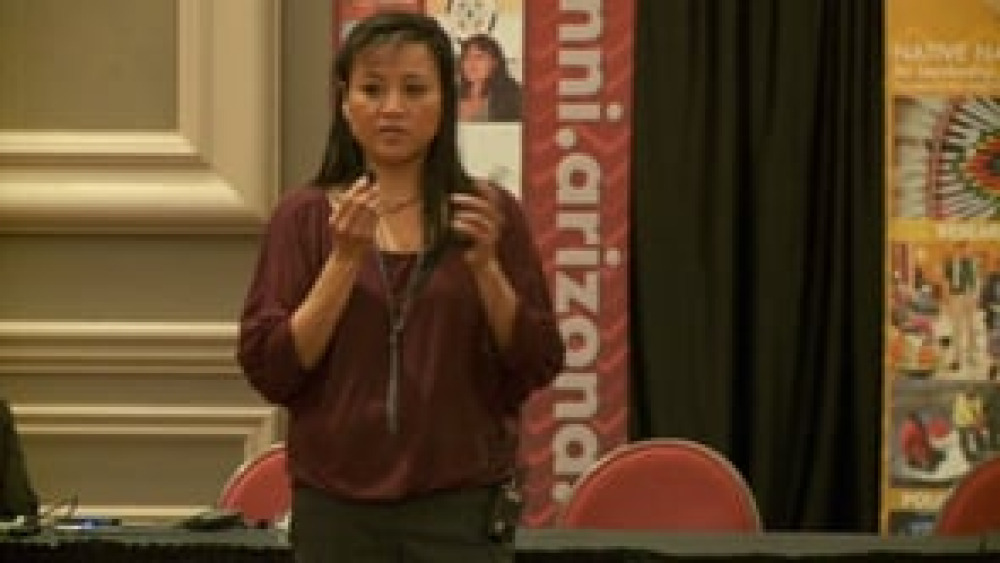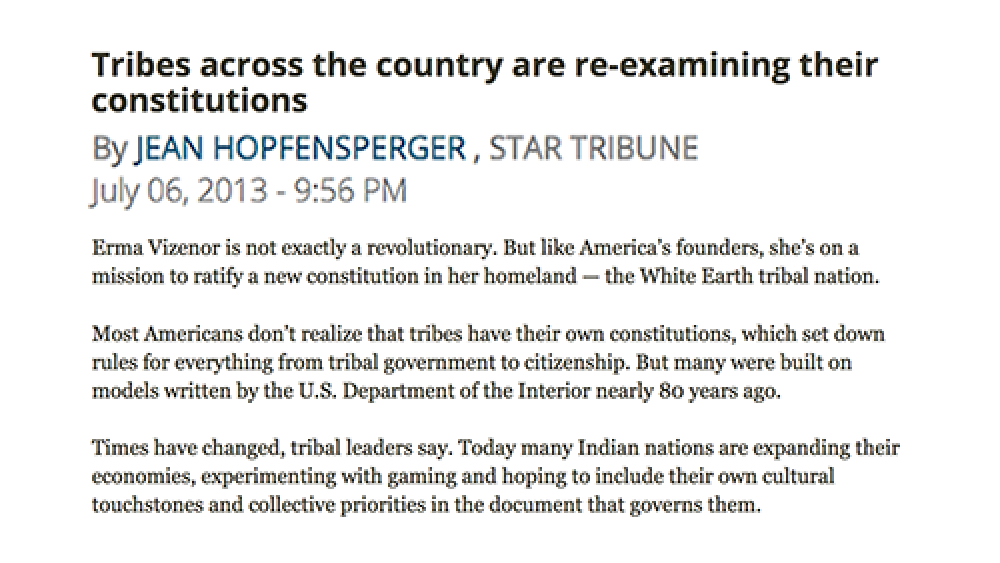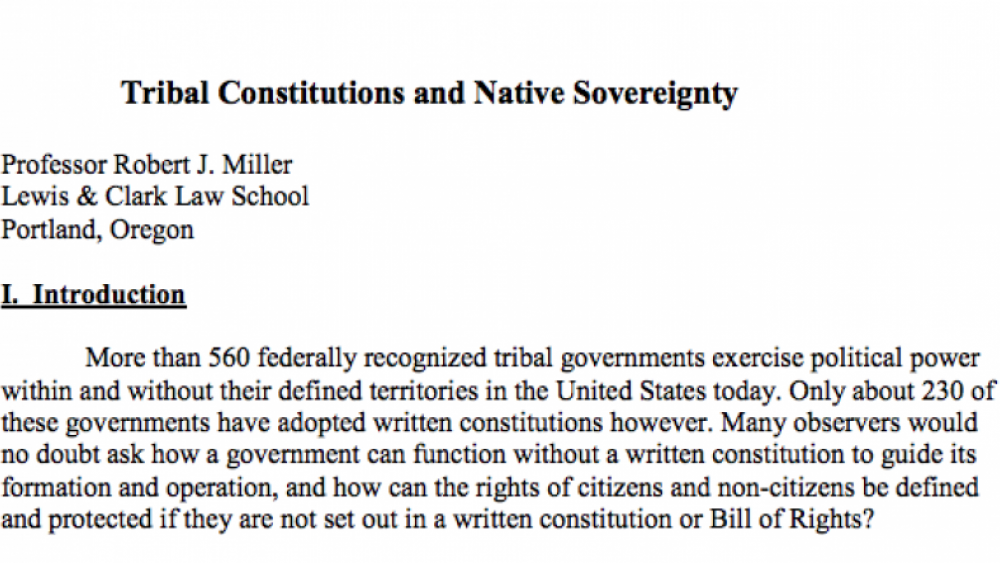In this informative interview with NNI's Ian Record, Vice-Chairwoman Jennifer Porter of the Kootenai Tribe of Idaho explains what prompted her nation to enact several amendments to its constitution in the mid-1990s, and how its ability to govern effectively has been greatly enhanced by its decision to its cultural roots when it comes to how it elects its leaders.
Additional Information
Porter, Jennifer. "Cultural Match Through Constitutional Reform at Kootenai." Leading Native Nations interview series. Native Nations Insitute for Leadership, Management and Policy, University of Arizona. Tucson, Arizona. April 2, 2014. Interview.
Transcript
Ian Record:
“Welcome to Leading Native Nations. I’m your host Ian Record. On today’s program, we are honored to have with us Jennifer Porter. Jennifer Porter is the former Chairwoman and now Vice Chairwoman of the Kootenai Tribe of Idaho. And we’re here today to talk about the Kootenai Tribe of Idaho’s constitution and some of the recent efforts they were engaged in to amend their constitution and how it’s working, etc. I guess we’ll just first I guess have you start off by just telling us a little bit more about yourself.”
Jennifer Porter:
“Okay. Good morning. My name is Jennifer Porter, Vice Chairwoman of the Kootenai Tribe. I’ve been on council for the past 17 years, I believe, so this would be my fourth term as a council member. I don’t know what else you want besides that. I could go in depth [on] family...”
Ian Record:
“Yeah, sure. Why not.”
Jennifer Porter:
“...I’m a mother to three children ages, 20, 14 and 12, recently a grandma. That was a big part of me stepping down from chair so I could have more time to just enjoy my life now.”
Ian Record:
“That’s good. You’ve got to have balance, right?”
Jennifer Porter:
“Oh, yes, and I’m loving it.”
Ian Record:
“And it’s hard to achieve that as an elected leader I know.”
Jennifer Porter:
“It is, yes.”
Ian Record:
“So we’re here to talk about your tribe’s constitution and you’re here in Tucson this week to serve as one of our presenters for our Tribal Constitution seminar. And one of the reasons that we focused on your tribe and on you in particular is because back in the mid-1990s, your tribe engaged in a referendum vote that ended up approving a set of amendments. And from what you were telling me yesterday there’s quite a back story to how all this came to be. And I guess we can start...if you could start just talking about where the tribe was in the mid-1990s, what sort of constitution it was working with, and sort of what prompted the tribe to go down the reform road.”
Jennifer Porter:
“Sure. It was pre-my term as a council, but I was of the age to understand, out of college. I worked in the accounting department and closely related to the council so I got to see what was going on and hear, read the minutes and such. And at that time and for a number of years prior to that, our constitution, it stated that it was a five-member council and one of those members was the hereditary chief and he had a seat on council. So every three years an election came, they elected four different council members, but the chief always had the residing seat on council. And that stemmed problems.
In our community, we are made up of three main families and three -- odd number -- there’s always one ousted. So every election they would elect two of those families to the council whoever the chief at that time was getting along with. And basically it came to where it was the chief and the chair that they would either be with each other or against each other and every time there was a discrepancy they would oust whoever the chair was or oust whoever the councilman that was going against whatever it was.
So at the time, my mother was the current chair and she said there was so much uproar all the time about decisions being made that whenever something was...a resolution was passed, an ordinance was made, she was just waiting for a petition from the tribal members. There were times where she went off to meetings and she would come back and she would be petitioned off the council and they would have to go through the whole system of putting her back on and it was just like that. It was just always...you just never knew what was going on at the time and it kind of...it stemmed from that where she just got tired of it. If they wanted her on council, if they wanted these four people on council for the three years then they needed to come up with some kind of agreement.
So what she had said, and I liked in yesterday’s...some of the, I forgot who that was talking, but he said that we need to go back into our old ways, our cultural ways, our customary ways of how we got together, how we determined where and how we’re going to move forward. Well, she went back to that and she went back to the elders and what she was told is that we would come together as families, the family heads would come together, the households, they would have council. And that’s what led her to her decision and she called all of the major...the three major families, the households, the people that she in the past had sat on council with. She called those people to the table. She also called some of the elders to the table that she knew that people listened to that made the difference, had certain wisdom amongst the community. She was able to gather them all at the same table. They talked and they came to an agreement. Some of them were for it, some of them were against it, but when they really thought about it, having districts...families having three different districts, then it was a win-win for everybody because no matter who was getting along, who wasn’t getting along, as a family you would always have two representatives on the seat of the council.”
Ian Record:
“So basically the solution was, ‘We’re going to do away with this system where...’ How did it work under the prior system where you had these five council members, one of which was a standing position with the hereditary chief, right? And that person sort of had a different status than the other four? Were the other four voted on at large by the entire community?”
Jennifer Porter:
“By the community, yes.”
Ian Record:
“So you could have a family who would not have any representation at all...”
Jennifer Porter:
“Yes, yes.”
Ian Record:
“...on the council. And so you moved to this system which makes more cultural sense and also ensures that virtually everybody in the community because they’re going to be from one of these three main families in some respect would have a voice in the decision making process. Was that basically the premise?”
Jennifer Porter:
“Yes, it was.”
Ian Record:
“So then in August of 1995, the tribe goes forward with these four amendments and this is to amend the 1947 constitution. I’m curious, what is your knowledge of that 1947 constitution? I believe that’s the first written constitution of the tribe.”
Jennifer Porter:
“That was the first written [constitution] of the tribe, correct.”
Ian Record:
“Do you have...do you know much about how that original constitution came to be and who sort of authored it and anything like that?”
Jennifer Porter:
“No. I was looking at the signatures of that and those were the people of the community, the past leaders, just some... the historians, yeah. And it’s interesting how it was written and as the chief had always a standing place on the council.”
Ian Record:
“So in August of 1995, as I mentioned, these four amendments are put up to vote and I’ll just roll through them very quickly. The first one deals with the issue of blood quantum and I would assume making a change to at least one-quarter...”
Jennifer Porter:
“Yes.”
Ian Record:
“...degree blood quantum in descendancy from someone on a base roll. Amendment D basically just is a name change. You’re changing the name from Kootenai Tribe of Indians to Kootenai Tribe of Idaho. Those turned out to be not so controversial, which you would...it’s interesting that the blood quantum one doesn’t turn out to be controversial because...”
Jennifer Porter:
“Right.”
Ian Record:
“...folks will understand why here in a second, that the second amendment deals with exactly what you said, this change to this family-based system of representation on the council, per the three main families. And then the third amendment deals...is a related one that deals with changing the quorum requirements in accordance with how this new council was going to be constituted.”
Jennifer Porter:
“Yes.”
Ian Record:
“So you guys hold a vote, you pass all four amendments, you send them to the BIA [Bureau of Indian Affairs] per your constitution, which says that the Secretary of Interior must approve of amendments to your constitution, which is typical language of tribal constitutions from that era. Then tell me what happens next.”
Jennifer Porter:
“So the first amendment was approved, the last amendment was approved, and just like you said they didn’t approve the districts and the idea of breaking the council up into the district families. So what does our council do? They...what we were told, the reason for that, I did find that out was basically because our tribe was very small at the time, it was maybe between 100 and 120 members, that BIA felt that it wasn’t...they were adhering to the U.S. vote of one vote, one person and since we were a small tribe they thought that not everybody in the tribe would have that vote if we broke it up. But we had the argument where each person would be represented though. They have the vote to their member, their family member being on the council. So I see that our council was very bold at that time, they were going in the direction of self-determination, exercising their self-governance. So they brought the 70 percent of the general membership, which I know there was way more than 70 percent at that time, came together because they wanted this to pass. They liked this whole concept and the whole idea. They came together and they voted to do away with the BIA approval. It happened, we sent that in and I believe that happened in ‘95 or ‘96 that BIA approved that. So less than a year later we instilled our own...the new amendment, too.”
Ian Record:
“So it’s been in place for close to 20 years now and I’m curious, you’ve been in a position of leadership within your tribe for virtually all of that time and you have a window into how divisive the previous system was. Can you compare how those two approaches to how the Kootenai citizens are represented in the decision-making process of the government and how those two have differed, how they compare and contrast?”
Jennifer Porter:
“Well, I was very blessed to be in the newer version of the constitution. I’d like to say I’ve never been petitioned off the council. I’ve never seen a petition since I started. Unfortunately, it was a loss of one of my family members is how I walked into our council. It was actually the first term of this new...the new constitution and he had passed away. So my family voted me into his...so I fulfilled the rest of his term, which was the three years. Since then it’s...I can only say good things about it. There have been no more petitions. Each member, if you go back home and you ask them, they all know who’s sitting on their family on the council. If they have an issue, the way the council works now is we ask them, ‘Have you talked to your family representative first?’ If they want something brought to the table, they have to go to their family representative. So it’s kind of like a two-point process. They can’t just come into a council meeting anymore. They have to have their family’s approval, they discuss it, and then it comes to the council. So as long as we know where they’re coming from, what kind of direction or what questions they’re asking.”
Ian Record:
“So from what you’re saying, I gather your governance system has become a lot more stable.”
Jennifer Porter:
“Yes.”
Ian Record:
“Because the leadership is...there’s continuity there and there’s not as much in-fighting or perhaps any in-fighting of note. And then there’s also an ability for people to get their needs addressed where it doesn’t consume the entire council’s attention. So I would imagine that frees you up to really focus...sort of be more forward looking and strategic in figuring out, ‘Okay, what direction do we want to head and what do I need to understand and learn as a council member or as a chair or vice chair in order to get us there,’ versus being distracted by constituent concerns that are better addressed at the family level. Is that accurate?”
Jennifer Porter:
“That is accurate. It seems like every family has their interest, like one family has a cultural interest, another is education, another is economic development so it kind of made it to where each family can invest more time with that, but also bringing it to the table and able to work together. We don’t have to deal with the, ‘Someone doesn’t like someone' or 'They did this to me years ago.’ Yeah, it’s just not dealt with anymore as on...they have to deal with that within their own district.”
Ian Record:
“So have you seen a shift in how the average citizen regards the government as a whole since this change was made? I would imagine with that back under the previous system if there’s a lot of infighting, if there’s a lot of petitioning to say, ‘Oh, let’s throw that bum out. He doesn’t agree with me,’ or whatever, that tends to feed among the people a very low regard for government and a very low regard for leadership in whoever’s holding that position. Have you seen a change in terms of how the people tend to view their government? Is there more pride in the system and saying, ‘Hey, we can do things. We can make decisions. We can implement those decisions. We can really move forward.’”
Jennifer Porter:
“There’s a tremendous change. There is that pride there. There is that respect that wasn’t seen there before. It took them a few years to actually get the concept of, ‘Hey, I can bring something to the council. All I have to do is go talk to my family rep,’ instead of feeling like nothing can be done until we get a family member in there. So now they do have that voice, they can make a difference. And right now it’s broken down to council each has their different interest in the area and it’s kind of like if they don’t feel comfortable going to this council talking to education they’ll talk to their family member and then that family member will go talk to that council. So it’s kind of...it works so much better. It’s more...even though it’s more family based, it works better for the community overall.”
Ian Record:
“So are there other areas of the constitution that the tribe perhaps is having a conversation about changing or strengthening or anything like that? Is there more attention being paid now to figuring out, ‘Okay, yeah, things are working well. Are there ways we can make it work better,’ or are things just sort of chugging along.”
Jennifer Porter:
“Things are working well as it is and I think it’s more if it’s working just let it be.”
Ian Record:
“Well, that’s great. I wish I could say this is a typical story coming out of Indian Country but it’s...I think what Kootenai has done with you would think on its face one simple change, but it sounds like the trickle down effect throughout the government has been very constructive across the board. I think it offers a promising success story and a promising blueprint for other nations to look at to say, ‘If we just look to our own traditions, we just look to our own values and how we did things before and try to bring that forward into the 21st century we can achieve our own goals, we can govern well, we can make decisions in a unified fashion.’”
Jennifer Porter:
“And it was a blend. I like the way it was presented yesterday about going back to your traditions and your culture and the way I seen it when he was talking is it’s a blend of the culture and today’s world, bringing those together and being able to make it work.”
Ian Record:
“Well, Jennifer, really appreciate you taking some time to sit down with us. I know it was a little bit short notice, but I thank you for agreeing to share your story with us. We’re always eager to learn about new stories of constitutional success and constitutional enhancement and self-determination in action.”
Jennifer Porter:
“Well, thank you. It was a determination of...I think you guys have been asking me for like four or five years to come and I finally had the time.”
Ian Record:
“Well, persistence pays off, right?”
Jennifer Porter:
“It does.”
Ian Record:
“Well, again, thank you and hopefully others will learn from Kootenai’s story.”
Jennifer Porter:
“Thank you."



